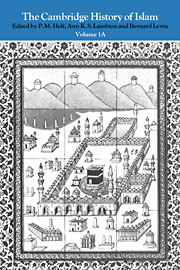Book contents
- Frontmatter
- Introduction
- Part I The rise and domination of the Arabs
- Part II The coming of the steppe peoples
- 1 The disintegration of the caliphate in the east
- 2 Egypt and Syria
- 3 Anatolia in the period of the Seljuks and the Beyliks
- 4 The emergence of the Ottomans
- Part III The central Islamic lands in the Ottoman period
- References
3 - Anatolia in the period of the Seljuks and the Beyliks
from Part II - The coming of the steppe peoples
Published online by Cambridge University Press: 28 March 2008
- Frontmatter
- Introduction
- Part I The rise and domination of the Arabs
- Part II The coming of the steppe peoples
- 1 The disintegration of the caliphate in the east
- 2 Egypt and Syria
- 3 Anatolia in the period of the Seljuks and the Beyliks
- 4 The emergence of the Ottomans
- Part III The central Islamic lands in the Ottoman period
- References
Summary
The foundation of the Great Seljuk empire and the domination of the Islamic world by the Turks is a turning point in the history of Islamic civilization and the Muslim peoples. At a time when the Muslim world was suffering from both external and internal crisis, the Seljuks with their fresh power, restored its political unity; with the new elements and institutions which they brought, they endowed Islamic civilization with a new vitality, and started it on a new phase. One of the basic changes brought about by the foundation of the Great Seljuk empire was, without doubt, the conquest and turkification of the Near East, and especially of Anatolia. Anatolia had been the homeland of many peoples, the scene of many civilizations, and had served them as a bridge between three continents; now for the first time in its history, in spite of the continuing local influences, Anatolia underwent a radical transformation from the ethnic, religious, linguistic, cultural, and artistic points of view. If the foundation of the Great Seljuk empire presents an important phase of Islamic civilization and Turkish history, the turkification of Anatolia is of equal importance, in the period after the fall of this empire and its successors, both in preserving Islamic civilization and the Muslim peoples, and in determining the future of certain Muslim and Christian nations. The origins and the historical role of the Ottoman empire prove this point. In spite of its importance, however, the history of the Seljuks has remained obscure, and it is only in our time that its historical significance has begun to be understood.
- Type
- Chapter
- Information
- The Cambridge History of Islam , pp. 231 - 262Publisher: Cambridge University PressPrint publication year: 1977
References
- 3
- Cited by

